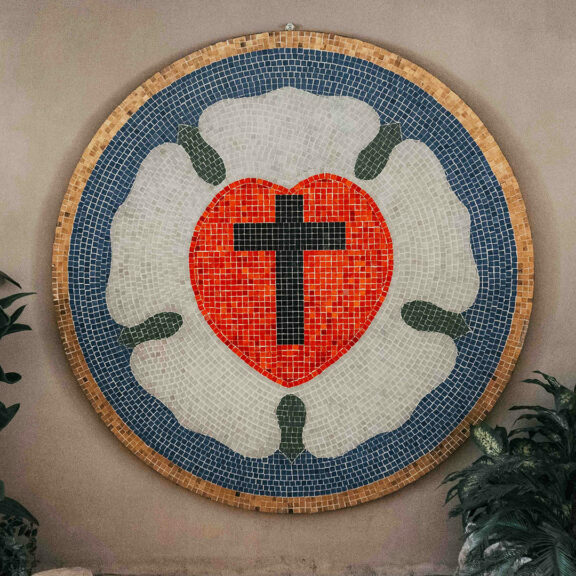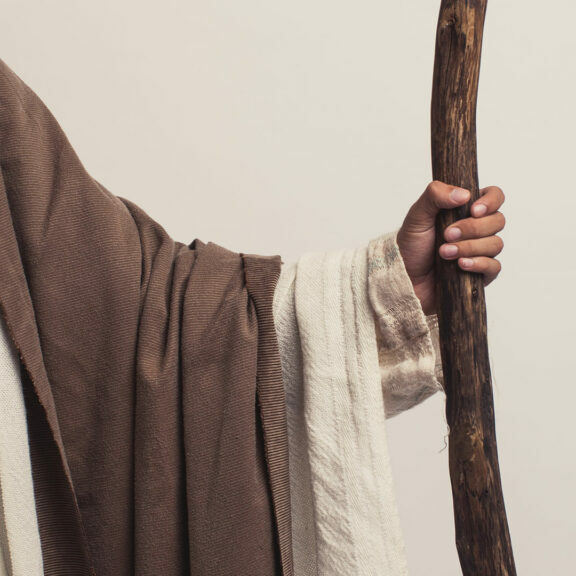August 5, 2018
Pastor Gunnar Ledermann
42 A man came from Baal Shalishah, bringing the man of God twenty loaves of barley bread baked from the first ripe grain, along with some heads of new grain. “Give it to the people to eat,” Elisha said.
43 “How can I set this before a hundred men?” his servant asked.
But Elisha answered, “Give it to the people to eat. For this is what the Lord says: ‘They will eat and have some left over.’” 44 Then he set it before them, and they ate and had some left over, according to the word of the Lord.
2 Kings 4:42-44
When doctors talk to you about how to feel comfortable, rather than treatment options, you know that whatever you have isn’t going away. Naaman had to come to terms with that reality because he had an incurable disease, leprosy. He was the commander of the army for the king of Aram, but even with all the perks that came with that high position, his leprosy still was not going away. Naaman had given up hope for a cure until his wife’s servant girl, an Israelite, told him he should go see the prophet in Israel. She said,
“He would cure him of his leprosy.”
The words the servant girl spoke were what he wanted to hear, but could it be true? A similar question was asked in our first lesson from 2 Kings 4, and both questions are really asking, “Can we trust God to provide?”
The short section from 2 Kings 4, often titled the “Feeding of a Hundred,” that we are meditating on today comes just before the account of Naaman in 2 Kings 5. It comes in a series of situations involving the prophet Elisha. Elisha was the apprentice of the prophet Elijah. Only a couple chapters before this account, Elijah finished his ministry as a prophet to Israel and his time on earth by being taken into heaven in a fiery chariot. Just before he was taken into heaven, Elisha had asked him for a double portion of his spirit and Elijah told him he would get it if he saw him taken into heaven. Elisha did see Elijah go into heaven in his fiery chariot, so he did inherit a double portion of Elijah’s spirit allowing him to do many miracles and serve as God’s prophet to Israel.
During Elisha’s time as prophet to Israel, there was a famine. In our first lesson from 2 Kings 4, we hear that
42 A man came from Baal Shalishah, bringing the man of God twenty loaves of barley bread baked from the first ripe grain, along with some heads of new grain. “Give it to the people to eat,” Elisha said.
Elisha was with the other prophets at the time and as there was a shortage of food because of the famine, the man’s giving of bread and grain was a welcome gift. It was a welcome gift and Elisha was happy for it, but the man who brought it didn’t share Elisha’s joy and optimism. Instead, the man said, 43 “How can I set this before a hundred men?” The man’s question was not off base, he knew from experience that his donation was not enough for all the men gathered, but Elisha trusted God to provide.
Situations that strain our trust in God to provide are all around us. Just a couple weeks ago, the world watched as twelve teenage soccer players and their coach were trapped for over two weeks in a cave during the monsoon season. It seemed an impossible task, but with the help of experts, equipment and many divers the boys were freed. Watching the events of the boy’s rescue is enough to give any of us sweaty palms and to make us wish we had more than just ten finger nails to bite as our nervous habits get the best of us. Most of us will never find ourselves in situation as dire as a cave rescue, but we do face situations like the one that faced Elisha and the hungry prophets.
Many times, we face problems that seems too big for us to solve with what we have available. It could be that you’ve found yourself stuck on the side of the highway with a flat tire hoping that someone would stop and help or hoping the gas would last long enough to keep you cool while help arrives or hoping you’ve got enough in savings to cover the tire and any other repairs. It could be that you and your family have enough food to eat, but you know there are so many in the world, this country and even in our home town that go hungry. You would like to help, but the task seems so big and you already have so much scheduled that finding the time to help and believing it would make a difference prevents you from helping. It could be that you are facing a disease, disability, divorce or disappointment that as far as you can see has no cure and all you can do is try to feel comfortable, if there even is a way.
Naaman was not finding a way to be comfortable as he struggled with leprosy, which is why he was willing to put his wife’s servant girl’s advice to the test. Naaman went to the king of Israel and asked him to heal him. The king wasn’t able to help him, but when Elisha heard Naaman’s request for help,
Elisha sent a messenger to say to him, “Go, wash yourself seven times in the Jordan, and your flesh will be restored and you will be cleansed.”
2 Kings 5:10
The cure was simple, but for Naaman it sounded like mockery. He wondered how the prophet could ask him to wash in the Jordan when the rivers of his homeland were far better. He had also expected the prophet to come to him and call on God in his presence to heal him.
It’s a struggle for us to trust God to provide when his answers seem so simple. It is especially hard for us to trust God when we have a real struggle in our lives. When we hear what Jesus did in the gospel lesson for today from John 6, that Jesus fed thousands of people with five loaves of bread and two small fish, we are amazed, but also uncomfortable. When we hear that Jesus so easily and willingly helped feed all those people, we wonder why he can’t seem to spare some of his power to provide for our needs.
When the man from Baal Shalishah came with twenty loaves of bread and some grain, he wondered how it would provide enough food for a hundred men. He also wondered how the prophet Elisha could say so confidently,
“Give it to the people to eat.”
Elisha was so confident because he trusted God to provide. When the man was wondering how his small gift would make a difference, Elisha’s full response was,
“Give it to the people to eat. For this is what the Lord says: ‘They will eat and have some left over.’” 44 Then he set it before them, and they ate and had some left over, according to the word of the Lord.
Elisha was not delusional, he understood how the man could wonder how the equation of twenty loaves of bread and a hundred hungry humans would balance. Elisha was confident because God had already told him he would provide enough food for everyone and some left over.
It is important to understand the full context of what happened with the “Feeding of a Hundred,” so that we do not fall into the trap of what is often call ‘prosperity gospel.’ Very simply, prosperity gospel is the belief that God intends for every Christian to be healthy and wealthy. This belief is very dangerous because it is not true and it can lead to a believer losing trust in God. Belief in prosperity gospel can lead to unbelief because a believer who does not become healthy and wealthy and especially those who fall on hard times, can conclude that either God doesn’t exist or I would be healthy and wealthy or God does exist and I am not a true believer or I would be healthy and wealthy.
We have to understand the context of any portion of God’s Word we are reading or we may fail to understand what comfort and treatment God has for us. Our second lesson from 2 Corinthians 9 serves as a good example of a section of God’s Word that can be misunderstood and misquoted. Paul wrote to the Corinthians,
8 “And God is able to bless you abundantly, so that in all things at all times, having all that you need, you will abound in every good work.”
Now, if you were to tweet, post or text this to someone, they might get the idea that God is always going to give us all we need and so much so that we will be able to give to others. The key word that makes this thought dangerous is “always.” On the one hand, God is able to bless us and many times he does so that we even have enough to help others. On the other hand, there are also times when we do not have enough to help others or ourselves. Does this mean that God is a liar, his Word contradicts itself and we should put our faith in something else? No!
The context of 2 Corinthians 9, deals with a collection of offerings to help the Christians in Jerusalem being taken up by the Christians in Macedonia and Achaia, which is modern Greece. In these verses, Paul is assuring the Corinthians that their planned offerings to help their fellow Christians will not bankrupt them because God will provide. The take away for us in this context is then not to believe God is going to make us rich, but that God is able to provide us with what we need.
When we feel like God isn’t providing for us, we often need to stop and make sure we are not expecting something from God that he hasn’t promised to provide. The five thousand men and also thousands of women and children that Jesus fed fell into the trap of expecting something from God he had not promised to provide. The last two verses from our gospel lesson from John 6 end like this,
14 After the people saw the sign Jesus performed, they began to say, “Surely this is the Prophet who is to come into the world.” 15 Jesus, knowing that they intended to come and make him king by force, withdrew again to a mountain by himself.
The people saw Jesus’ power and wanted Jesus to use that power to become their king, but not the kind of king Jesus came to be. They wanted him to overthrow the Romans, reestablish the earthly, physical kingdom of Israel and provide them with bread or whatever else they needed, but that was not Jesus’ mission.
Jesus came into this world to provide us with what we truly need. Jesus came to this world to save us from our sins. He came to save us from all the situations that are too much for us from frustrations out on the highway to trouble at school to losing a job to sickness to broken relationships to the hardships that aren’t going to be cured this side of heaven. All of these things are the result of sin and they eventually lead to death. And if we die without trust in our Savior, then we die with all the pain and suffering of our sins weighing us down and separating us from God forever in hell. Jesus saved you and I from all of that by leading a life without sin, sacrificing himself on the cross to pay for our sins, rising from the dead and assuring us that we will also be raised from the dead to join him in heaven to live there forever. Jesus’ work to save us from sin, death and the devil were his greatest victories, but he also means to give us blessings before we enter heaven, even curing incurable diseases.
When Naaman went to Israel to be cured, he did not like what Elisha asked him to do. Naaman did not want to wash in the waters of the Jordan and in his frustration, he turned and went off in a rage. Then, his servants went to him and told him that
if the prophet had told you to do some great thing, would you not have done it? How much more, then, when he tells you, ‘Wash and be cleansed’!”
So, Naaman washed himself and he was completely healed. Then he went back to Elisha and said,
“Now I know that there is no God in all the world except in Israel.”
God may not provide for everything you want, the way you want it, but he has provided your Savior Jesus. I’m sure if you also take some time to look back on your life and look at where you are now, you will have many things for which to give thanks to God and even some extra blessings you can share with others. God’s cure for the hardships in your life may not take full effect until heaven, but you can live in comfort knowing that Jesus is your Savior, he loves you, heaven is yours and God is still working miracles today. When you are in need be like the prophet Elisha and always return to God’s Word to remember what he has promised. Then may the Holy Spirit strengthen you to trust God to provide. Amen.



